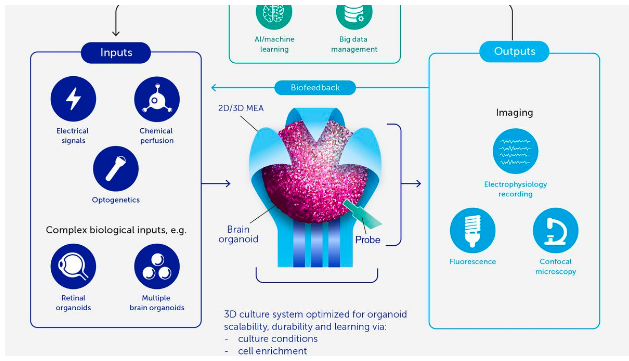Context:
Scientists at Johns Hopkins University (JHU) recently outlined a plan for a potentially revolutionary new area of research called “organoid intelligence”, which aims to create “biocomputers”.

Image Source: The Hindu
What is biocomputer
- Here, brain cultures grown in the lab are coupled to realworld sensors and input/output devices.
- The scientists expect the technology to harness the processing power of the brain and understand the biological basis of human cognition, learning, and various neurological disorders.
Premise of this technology
- Studying the human brain has been difficult, and researchers have traditionally used rat brains to investigate neurological disorders.
- Scientists are now building 3D cultures of brain tissue in the lab called brain organoids to develop systems more relevant to humans.
- Brain organoids are built using human stem cells and capture many structural and functional features of a developing human brain.
- Researchers use brain organoids to study human brain development and test drugs to see how they respond.
- However, brain organoids currently lack sensory inputs and blood circulation, limiting their growth and sophistication.
What is the new ‘biocomputer’?
- JHU researchers plan to create “bio-computers” by combining brain organoids with modern computing methods.
- Organoids will be grown inside flexible structures with multiple electrodes to record firing patterns and deliver electrical stimuli.
- Machine-learning techniques will be used to analyze the response patterns of neurons and their effects on human behavior and biology.
- Human neurons have already been grown on a microelectrode array that can both record and stimulate them.
- Brain organoids can be developed using stem cells from individuals with neurodegenerative or cognitive disorders.
- Comparing data between healthy and patient-derived organoids can reveal the biological basis of human cognition, learning, and memory.
Opportunities for ‘bio-computers’:
- Processing complex information: Bio-computers can utilize the superior processing power of the human brain to handle complex tasks.
- Researching neurodegenerative diseases: Brain organoids developed using stem cells from patients with neurodegenerative diseases can be used to decode the pathology of these diseases and develop drugs to treat them.
- Revealing the biological basis of human cognition: Comparing the data on brain structure, connections, and signalling between healthy and patient-derived organoids can reveal the biological basis of human cognition, learning, and memory.
- Advancing drug development: Brain organoids can be used to test drugs for effectiveness and safety before they are tested on humans, potentially speeding up the drug development process.
Are ‘biocomputers’ ready for commercial use?
- Scaling up brain organoids and incorporating non-neuronal cells is crucial for improving their computing capacity.
- Developing microfluidic systems and Big Data infrastructure will also be necessary to generate and store large amounts of data.
- Scientists have said that the challenge is now to establish long-term memory which is expected to be achieved this within 1-2 years.
- There is also a proposal for an ethics team to address any ethical concerns.
News Source: The Hindu The Hindu
![]() 6 Mar 2023
6 Mar 2023
